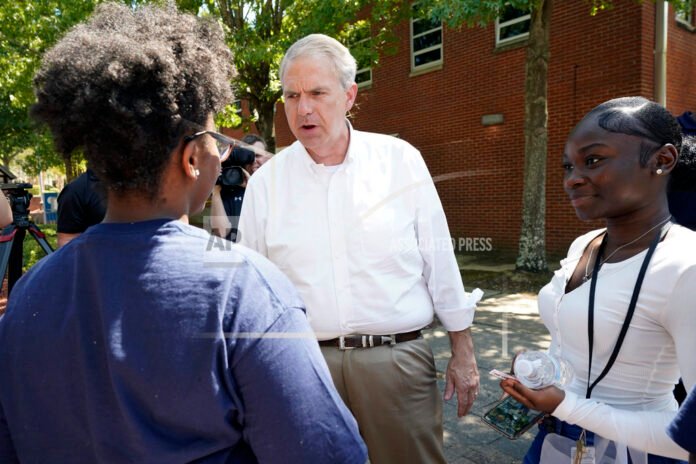
JACKSON, Miss. (AP) — An independent candidate running a low-budget campaign for Mississippi governor said Monday she is dropping out and endorsing Democratic nominee Brandon Presley as he tries to unseat Republican incumbent Tate Reeves.
But Gwendolyn Gray’s decision was announced more than two weeks after absentee voting had already begun, with ballots that list her along with Reeves and Presley.
Gray’s name will appear on the remaining absentee ballots and on the ballots that people cast on Election Day, Nov. 7, meaning that people can still vote for her.
“Once ballots are printed, it is what it is,” said Elizabeth Holbert Jonson, spokesperson for Secretary of State Michael Watson, the state’s top elections official.
In a statement released by the Presley campaign, Gray said she agrees with his pledge to invest in public education and to expand Medicaid to people who work in jobs that provide modest wages and no private health insurance.
“I trust Brandon Presley because he knows where so many Mississippians are, and he will always fight so people who work for a living can have a chance to reach their fullest potential,” said Gray, who has run a foundation that assists children who live in poverty.
Presley is a state utility regulator and cousin of rock icon Elvis Presley. He said he is honored to receive Gray’s support as he tries to earn votes from Democrats, Republicans and independents “who are ready to expand Medicaid on day one, cut the highest tax on food in the country, and clean up corruption once and for all.”
Reeves released a statement dismissing Gray’s support of Presley.
“I would like to congratulate these lifelong Democrats for coming together and making it clear that there is only one option for conservative leadership in this race,” Reeves said.
Nearly 40% of Mississippi residents are Black, and Presley is courting Black voters who traditionally are key to Democrats’ efforts to win in the state. Although none of the three candidates mentioned race on Monday, Reeves and Presley are white and Gray is Black.
Mississippi, for the first time, faces the possibility of a runoff in a governor’s race. Winning requires a majority of the popular vote. If no candidate tops 50% in the general election, the top two candidates will advance to a Nov. 28 runoff.
The state previously used a more complex method of electing a governor. In addition to winning the popular vote statewide, a candidate had to win in at least 62 of the 122 state House districts. If no candidate fulfilled those requirements, the race was decided in the House of Representatives, where members were not required to vote as their districts did.
The old election method was a Jim Crow-era provision designed to undermine Black voting rights. Mississippi voters repealed it in 2020 after it was challenged in federal court.
___











